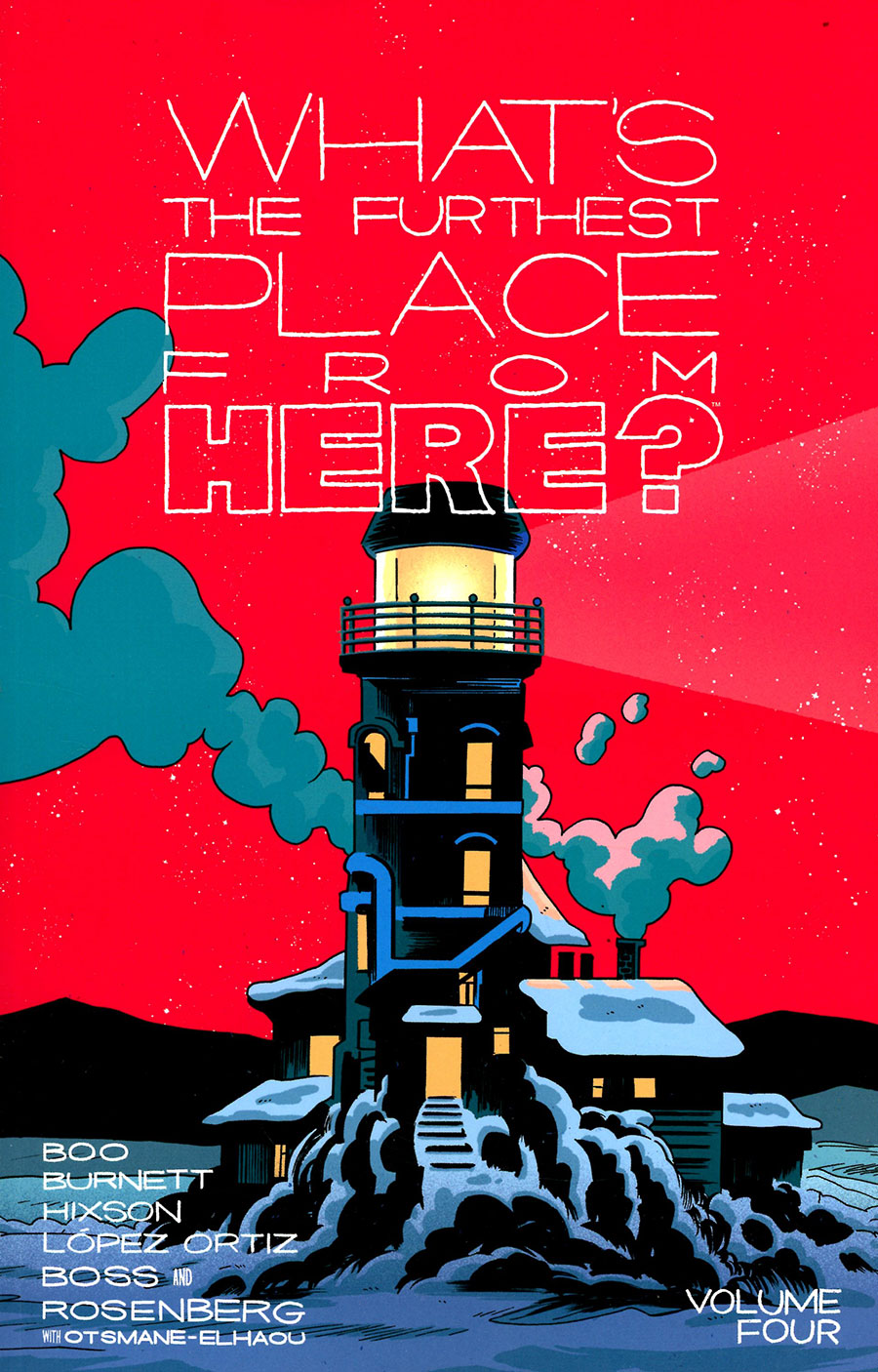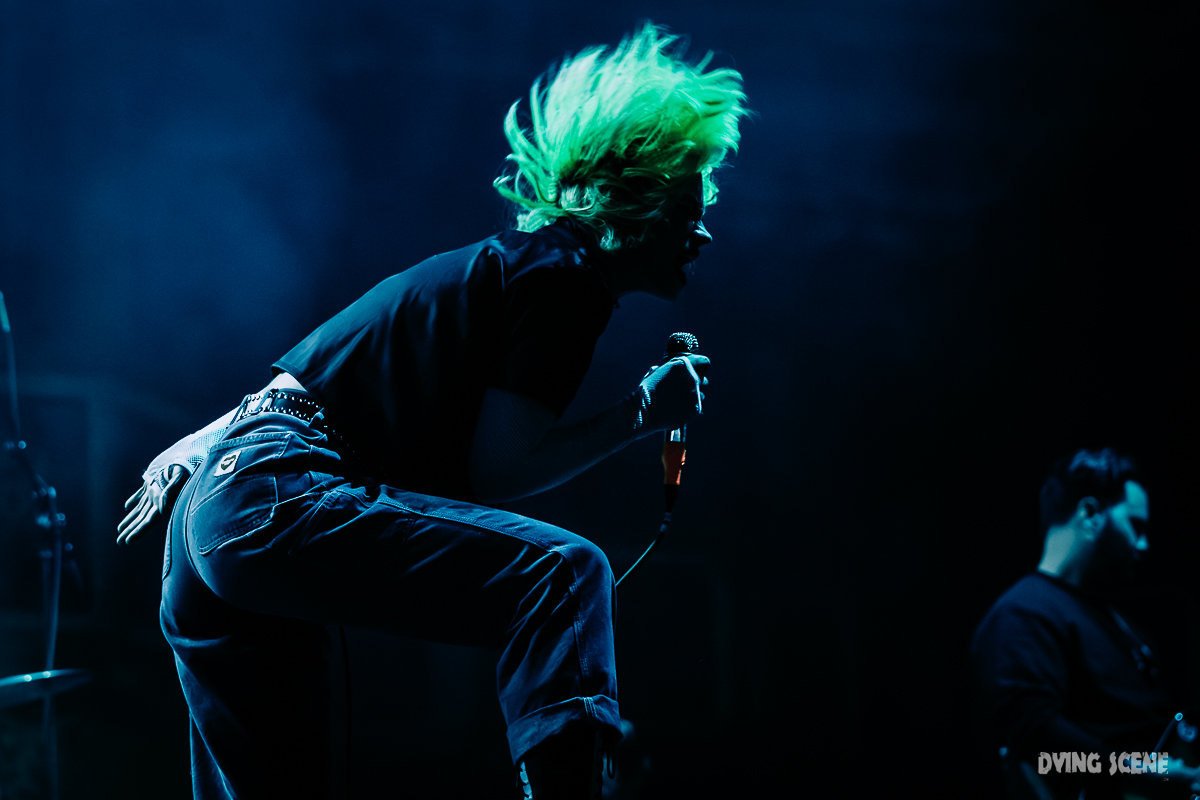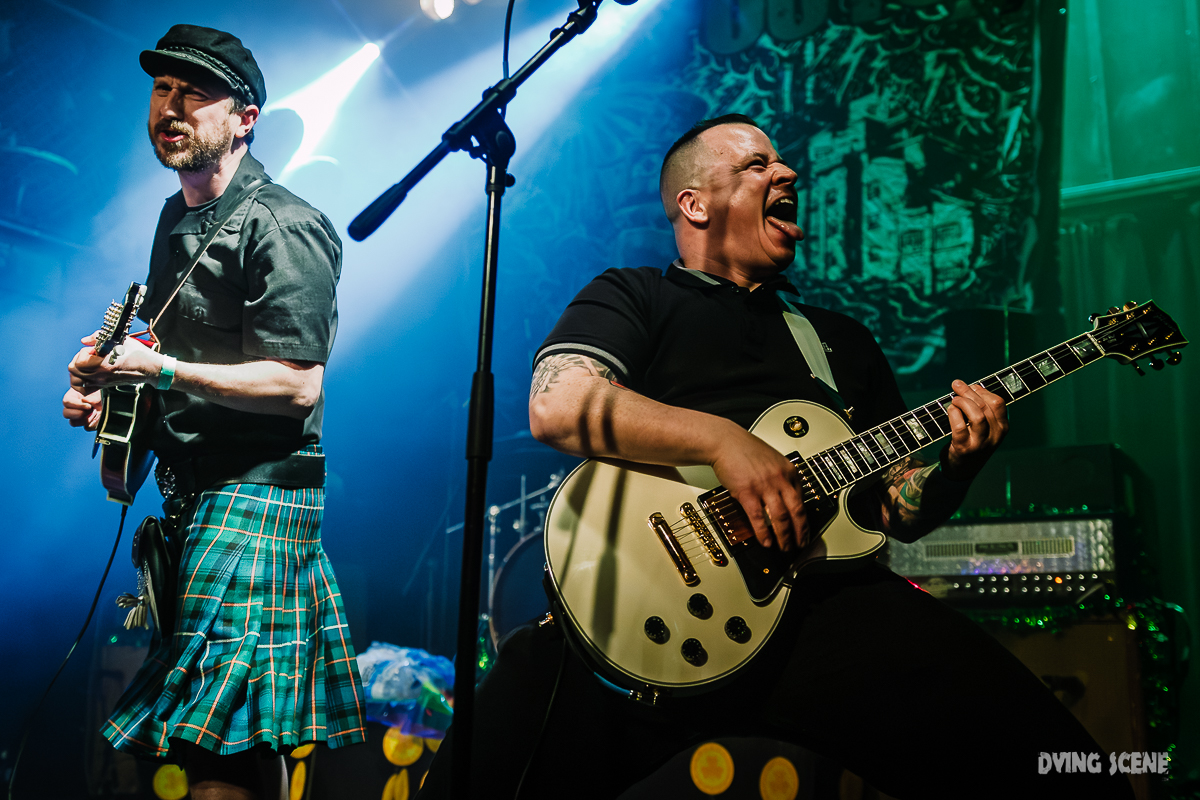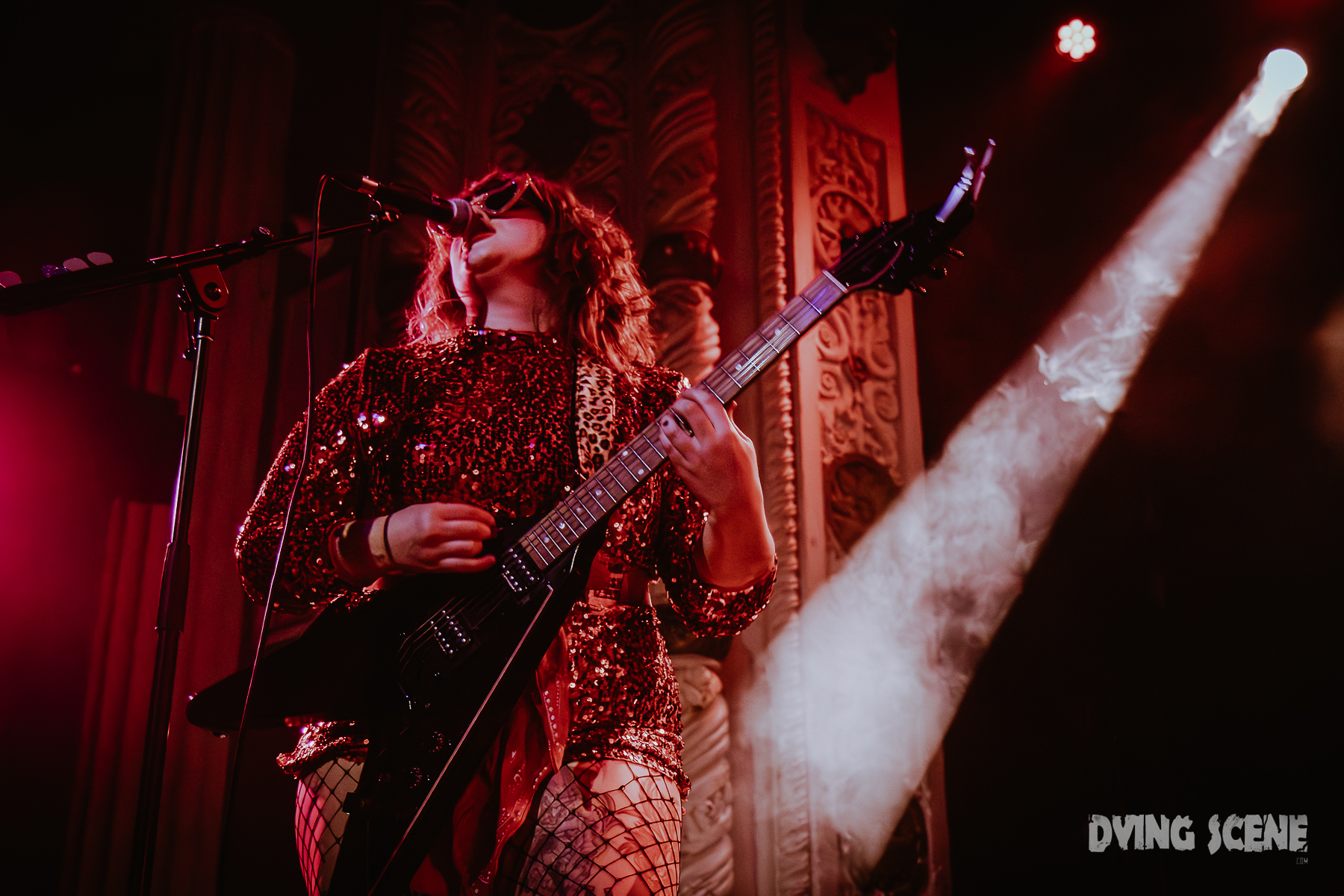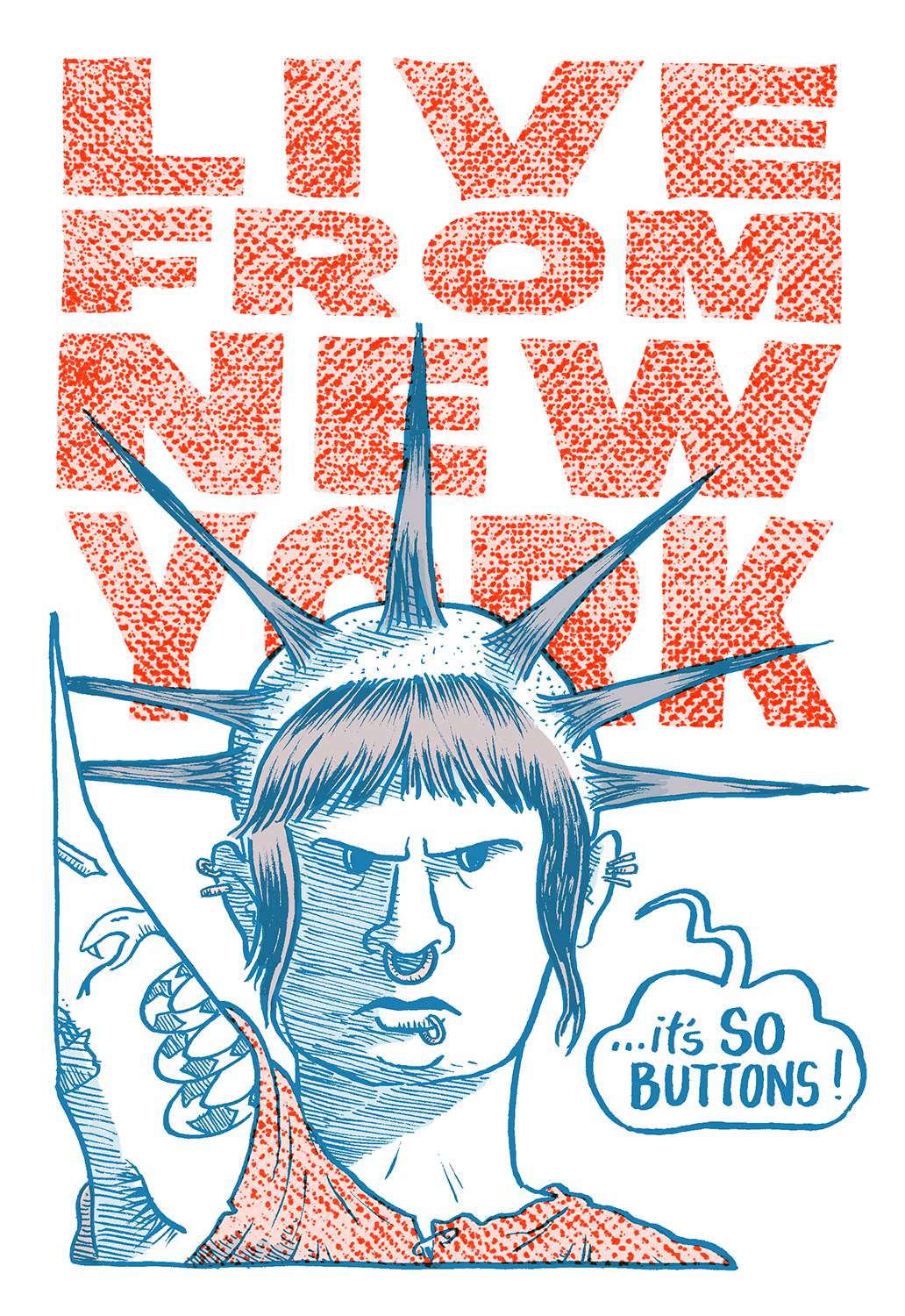When he is not playing with some of comic’s most popular IP, writer Matthew Rosenberg and his artist Tyler Boss bring us the comic What’s The Furthest Place From Here? While it’s not the most conventional comic book, there are enough moving parts for it to look familiar. Set in a post-apocalyptic world with no grown ups, WFTPFH‘s world is a cross between The Warriors and The Breakfast Club with punk rock kids. We caught up with Matthew Rosenberg to speak about his comics, punk rock, and the greatness of Blake Schwarzenbach.
Dying Scene (Forrest Gaddis): For people who aren’t familiar with you, can you give us a little background and tell us a little bit about What’s The Furthest Place From Here?
Matthew Rosenberg: I’m in New York City. I’m from here. I grew up in the punk and hardcore scene in New York. I used to run a small indie label (Red Leader Records) in my bedroom, tour with bands, put on shows, but eventually I worked at a merch company for a while. All the stuff that is punk rock jobs; I worked at a record store, worked at record labels. Putting out records was really kind of brutal. We were putting out records in a time of the rise of iTunes. Everything’s online and people were downloading things and it was hard to figure out how to sell music to people. We just kept having distributors go out of business on us. We put the label away and stopped doing it. I sort of looked for another job that I could do that was something I was as passionate about as music and punk rock. The only other thing in my life that was a constant was comics. So, I set out to make comics. I’ve been a comics writer professionally for a decade now. I got my start at Black Mask Comics. They first published me which was really serendipitous because they were all punk rock people. Black Mask was founded by Steve Niles who wrote 30 Days of Night.
Dying Scene: Okay, is it Steve Niles? I always thought it was Brett (Gurewitz) from Epitaph also?
Matthew Rosenberg: Yeah, it was also founded by Steve, who was in a bunch of Dischord bands back in the day. He was in a group with Matt Pizzolo, who is the third partner. He was a Long Island hardcore guy and put out the New York Hardcore documentary and a bunch of music stuff. I had friends who knew him. I went through Black Mask and did a couple books there and then moved on to Marvel. Now, I make books at DC and Image including What’s the Furthest Place From Here? which is my current ongoing series that I do with Tyler Boss.
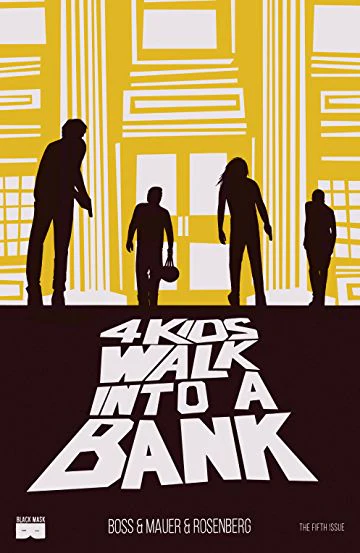
Dying Scene: Did you and Tyler come up with the concept together?
Matthew Rosenberg: Yeah, me and Tyler did a book together called Four Kids Walk Into A Bank and we knew we wanted to do another book together after that. So we started doing a different book and we realized that it was just Four Kids Walk Into A Bank, but sci-fi. We realized we didn’t want to do the same thing again. So, we sat down and tried to think of a book that would be very different from the book we made before and that’s some of What’s the Furthest Place from Here is. We wanted to do something that was big, sort of sci-fi and post-apocalyptic, ongoing, and had a big cast. We wanted to tell a story about kids who grew up in subculture, if that makes sense. We didn’t want to do a story about kids who loved comics and I said it should be kids who love punk rock. It should be kids who grew up surrounded by punk rock whether or not they fully understood it. The premise of What’s The Furthest Place From Here? is, it’s a post-apocalyptic story where there’s no adults left in the world. It’s just gangs of children and each gang lives in a building where they take on the personality of the business or the entity in the building beforehand. So, the kids who live in the bank control commerce and the kids who live in the police station try and enforce their own laws and rules on people. Our story follows the kids who grew up in a record store. They worship all the records that they grew up around and consider them their gods. They take care of them and try to do right by them. I’ve been working on it now for four years.
Dying Scene: How did you land on the Jawbreaker lyric as the title?
Matthew Rosenberg: I’m a big fan of taking lines from songs and things that meant a lot to me and I’m a lifelong Jawbreaker fan. They’re one of my favorite bands of all time. I think Blake (Schwarzenbach) is one of the great lyricists of all time, no qualifier. I think he’s up there with Bob Dylan, Leonard Cohen, and Joni Mitchell. I put Blake right on the same level as them. Finding a title for a book is really hard. I like a thing that is really evocative, but opens you to questions and leaves you wanting more. I remember being a kid and getting Dear You, just as an opening line to a song is just a devastatingly powerful opening line. It was like, well, maybe I can steal it. I emailed Blake and said, “Hey, I’m writing this book. I want to steal a line from your song. Is that okay?” He gave me his blessing and was really cool. We emailed a bunch and talked about the book. He’s just been awesome and supportive. If you’re going to steal, steal from really nice people who will be cool with it. (laughs) Let other people do the work of finding a great title and then you just take it.
Dying Scene: (laughs) It’s great. It’s the best way. Did you consider any other song titles for this?
Matthew Rosenberg: Oh yeah. We had plenty. We worked on the book for a long time. There’s a very early build of the book that I think only a few people have seen where it has a fully different title on the cover, but we never were a hundred percent on it. Finally, me and Tyler were on a road trip and I put on Jawbreaker. Tyler’s a big fan too. I told him, “this is it. This is the title.” I said it before I put the song on. He said, “maybe.” I put the song on and then he said, “no, that’s it.” Then it was done.
Dying Scene: Did you base any of the characters on any popular figures in punk or a type of punk in general?
Matthew Rosenberg: Sure. They’re not modeled after people exactly. Some of them are modeled after kind of your standard punk rock archetypes. There’s a couple early 80s hardcore skinhead kids and some sort of crusty kids, hardcore kids, riot grrls and sort of just an amalgamation of everything. Our lead character is a girl named Sid. Her name is actually Sidney, but everyone calls her Sid. It’s a little nod to Sid Vicious.
Dying Scene: Is Alabama based on (Patricia Arquette) from True Romance?
Matthew Rosenberg: Yes, but actually in the universe, there’s a different explanation for why her name is Alabama. There’s a point where we sort of reveal why everyone has the name they have, but originally, she was named after True Romance. As we changed up names, it stayed the same. We came up with this really good reason why people have these strange names.
Dying Scene: When you’re describing all the families and everybody has their own building. That’s a nod to The Warriors, right?
Matthew Rosenberg: It’s a bunch of stuff. The book is very much a love letter to a lot of different stuff that we grew up on. There’s a lot of people asking, oh, it’s The Warriors or Class of 99 or Nuke ‘em High or all these sort of post-apocalyptic things. And all of those are definitely in there. there’s a lot of Repo Man stuff in there. We don’t try to hide our influences. It’s a thank you list in the back of a record paying loving tribute to a lot of our influences all the time, and I think that’s a big part of what it is. We always think of the book sort of as a mixtape; influences thrown together to make one cohesive thing.
Dying Scene: The carnival is kind of the meeting of the gangs with Cyrus type of thing, essentially.
Matthew Rosenberg: Yeah, the carnival is this sort of a place of fun, and order, and retribution and all these things thrown together.
Dying Scene: Was it Coney Island? Is everything in New York?
Matthew Rosenberg: No, it’s not New York, but the land is so post-apocalyptic that the landscape of what it is has changed. So some things don’t always 100% make sense to people if they recognize this thing. It’s not a specific place to anyone, but us.
Dying Scene: I know you have the fourth volume coming out. When I was looking at the trades, there’s a big gap of issues between volumes one and two. Do these stories are fill that gap?
Matthew Rosenberg: Yeah, we’ve done four issues that were backstories that answer questions about the world and explain some things. Tyler co-wrote them with me and then we had some amazing guests come in and take a stab at building little pieces of our universe. When we were putting the trades together, we didn’t want to take in the single issues. It was fun to sort of be a little history lesson. We really liked the idea of changing the order and the way the story ends. Rather than spread them out, the first three volumes are just the story of our main characters. And the fourth volume is all this backstory that starts years ago, and gets you to where we are right now in the world. It’s funny because it’s volume four, but I’ve been telling people you could start with that if you want to; it explains some of the world. It’s new-reader friendly, but then you have to go back to volume one.
Dying Scene: Do you guys plan for how long the series is going for?
Matthew Rosenberg: We’ve had an ending since issue one. We’re gonna go to probably thirty. We’re just finishing issue twenty-two.
Dying Scene: You sold seven-inch records with some of the issues. Were any of those specifically recorded for the comic?
Matthew Rosenberg: Yeah, we reached out to all the bands individually and said that we’re doing a 7-inch of the month club, and we just want covers that are older songs. Some people did slightly newer things. We sent people the idea of some art and some issues when we had them. We put everyone in the studio and record the songs. I’m not a record label. We just want to do them on the 7-inches and then they were the bands’ to do what they want. So, Joyce Manor took their song and put it on their record. I’m super proud of that. A lot of the songs you can only get on these records for now. I hope eventually they hit a wider audience. The fourteen songs were made specifically for us. We actually had some more, but we had to cancel them.
Dying Scene: Bummer, were they not selling?
Matthew Rosenberg: They sold incredibly well. We were doing a monthly 7-inch project in a pandemic and a vinyl boom at the same time, which meant that there were a bunch of periods where there was no vinyl available. There was no paper, there was no material. And so there were just massive delays. And at a certain point, it was brutal. I didn’t want people to be waiting so long on records. Then we had distribution problems. Our distributor in comics threw a wrench in getting them out to people. They sold really well and people picked them up and were really enthusiastic. I don’t want to say who the bands were, but we had six or eight other bands lined up we either recorded or were about to. I try not to think too much about it, it’s sort of heartbreaking. A couple of them were favorite bands of all time. I’m really proud of the ones we did. The last record, which is Julien Baker (Smashing Pumpkins’ “1979”) and Sharon Van Etten (Nine Inch Nails’ “Hurt”) is sort of a good, real somber way to end. It’s a real sad, sweet, beautiful record.
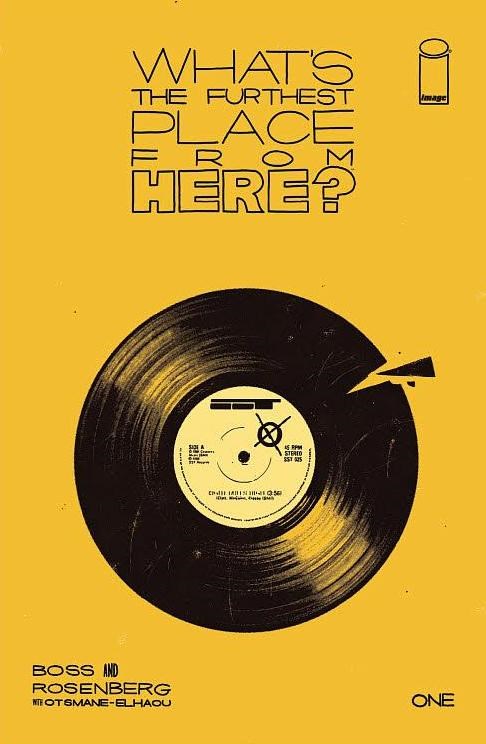
Dying Scene: Did you try to get Julien Baker to do the cover of “Accident Prone?”
Matthew Rosenberg: No, when I reached out to Julien, I said what the book was called and that Blake did a song. I left it open. We didn’t try to steer anyone to do anything. I’m a huge Julien Baker fan. I think she’s an amazing, incredible songwriter and musician, but I was just happy that she was down to do anything. It did cross my mind. I actually thought of her before I remembered that she did the cover of “Accident Prone.”
Dying Scene: It’s such a beautiful cover of that song. How does Blake do a cover of “All Night Long?”
Matthew Rosenberg: It’s great. His cover is awesome and beautiful and weird. When we were talking to him when the book started, I told him I wanted to do this. I wasn’t asking him to do it. He said, “I have one. I have a cover that I recorded, but it might be too weird. It’s a Lionel Richie cover.” And I said, “Oh, that’s not too weird. That’s perfect.” He said, “I took this sort of dancey fun song, I made it kind of somber.” I don’t know how many times I can say that’s perfect. That’s the exact tone we want. so he sent it to me. I love it so much. Putting out that record is one of the things in my life I’m most proud of; that’s one of my songwriting musical heroes doing this. It’s really fun. A lot of people who picked up the book and the records were comics people. And they didn’t know Jawbreaker. They didn’t know Blake, they didn’t know Jets to Brazil. I’ve had a lot of people reach out and really love this cover. I’ve said a lot of times, go listen to Jawbreaker, go listen to Bivouac, 24 Hour Revenge Therapy, Dear You, Orange Rhyming Dictionary, go listen to everything Blake has written. If I was just putting it out in a record store, I’m not introducing a lot of people to Blake Schwarzenbach’s music. Putting it out in a comic shop, I’m actually introducing one of the great songwriters and one of my heroes to people. And that’s just such a cool thing. It’s really unexpected. I don’t think people knew what it was gonna be when we told them Blake did a song. I think it caught people off guard. He just made it his own.
Dying Scene: The Screaming Females covering The Selecter’s “On My Radio” was a weird one for me, too. The Militarie Gun doing “Gimme Some Truth.” I didn’t know if they were gonna do the John Lennon or the Generation X version of it.
Matthew Rosenberg: They were very much, can we do a John Lennon cover? And I told them, you can cover anything you want. They kill it on that. I’m super happy with that. it’s sort of a Lennon deep cut a little bit. It’s a great song.
Dying Scene: I like how eclectic the bands that were covering and the bands being covered songs were.
Matthew Rosenberg: It was cool. Because some bands were trying for really big songs, like radio hits and, just do a take on this. And some were, this is just a big influence for us. Some obscure punk bands, indie rock bands, all over the place. that was what we wanted. That’s the whole point of the book. It’s just all these eclectic influences thrown in and So it was kind of perfect that I liked all these songs before and these are great covers of them.
Dying Scene: I’d never heard of The Kids before. So it made me want to go back and check them out.
Matthew Rosenberg: Oh, yeah, they’re awesome. We had to go and license all the songs we had to pay mechanical royalties. They don’t have a publishing deal in the US. A lot of times it’s automatic where you just pay mechanical royalties, and pay money. We’re pressing this many records, we give you this much. It’s kind of a standard fee. I didn’t want to do this without their permission. We had to hire a company to track them down and find them and get the mechanicals. They were just like, that’s awesome. You have our blessing. They didn’t want any money. I actually took the money that we were going to give them and donated it to charity. I wanted to do a little thank you for it.
Dying Scene: Has anybody asked about doing a film or TV adaptation of What’s The Furthest Place From Here?
Matthew Rosenberg: I can’t talk too much about that, but we have a deal for it. It’s being developed now. The thing I can talk about is that when you put out a comic on a certain level, like an Image Comic, it’s very much on the radar of a lot of Hollywood people from the go. They’re always looking out for things to adapt and buy, and so when a book comes out that’s like our book, you get a lot of inquiries from the start. You get a lot of producers and actors and directors and studios just asking if the rights are available? It’s always flattering, but me and Tyler knew that we were doing a huge story, and we’re doing a sort of non-traditional story. In a lot of comics, you read the first issue and it says, well, this is the premise of the book. These are the good guys. These are the bad guys. You’re going to follow them. Our book doesn’t work like that. We wanted to do a real three-act structure through the whole narrative of thirty-plus issues. You don’t really know what the book is about for a long time, and we didn’t want to go into conversations with people about adapting it or buying it or anything without them knowing what it was. We told everyone, we’re not going to have conversations about selling it or optioning it until we’re 10 issues out. We took it off the market immediately, which business-wise is probably stupid, but artistically I think was the right choice to do. When we brought it back out, we had meetings with all these people and big studios. A lot of them said, well, how would you see this as being a movie? I don’t have any idea how you’d make this a movie. It’s got this huge scale. Then we met with one company who said, “We know how to do it. It would be super faithful. We want you guys involved. This is how we do it.” It just made so much sense what they said. We don’t need to go out and have a bidding war on this. They understand what it is and they want to do it. They brought in some amazing people to work on it. So we’re really excited because people who’ve done some of my favorite stories in recent years are attached.
Dying Scene: I saw that you were in Ireland because they are making Four Kids Walk Into A Bank a movie.
Matthew Rosenberg: Yeah, me and Tyler went over to Dublin for a week right before Christmas. I think they just wrapped shooting the other day. Shooting over six weeks in and around Ireland. It’s really fun. It was a weird one.
Dying Scene: Did they do a good job matching it to Tyler’s art?
Matthew Rosenberg: Me and Tyler are producers on the movie, so nothing caught us off guard. We’ve been there at every step and we’ve seen from the concept art, look books, casting, and all of that. There’s places where they made choices to go a different way, which totally made sense because the comic would be hard to adapt as a movie. There’s a lot of stuff that is specifically for comics. You want someone other really talented people to come in and say, I’m going to do my version. Like when a band does a cover song and it sounds like the original song, what was the point of this? So they took their old spin on it. It’s incredibly faithful. I think it was really intense for Tyler being in the house that looks like the house and car he drew. It’s especially funny because the car he drew was based on his grandmother’s old car. So he said, it’s really weird that someone had to go out and buy the same model car as my grandmother drove in the 90s.
Dying Scene: That’s got to be insane. Just kind of like, this was in my brain.
Matthew Rosenberg: All the kids on set, they would just call them by their character names and their characters are named after people I grew up with who I’m very good friends with, lifelong friends, one of the characters is named after a kid who I’ve known since I was four years old. it was weird to hear people call his name and a different person comes down the stairs.
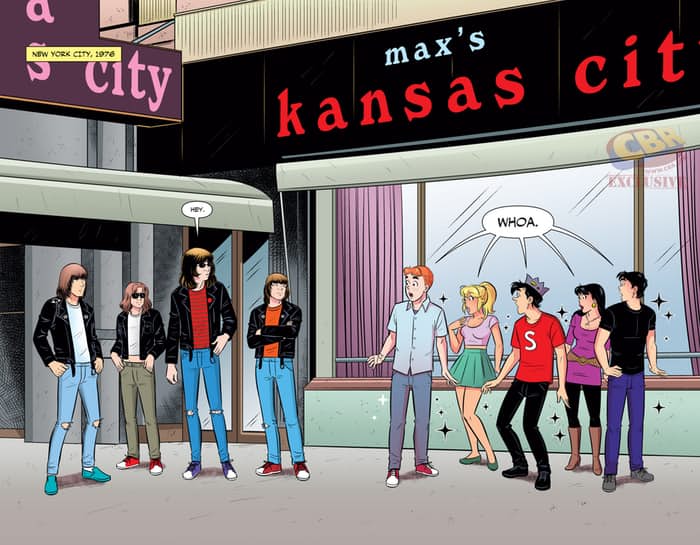
Dying Scene: I saw you did work on some of the Archie comics, too.
Matthew Rosenberg: I did. I’m really good friends with Alex Segura, who used to be a vice president of Archie. He’s a music guy and wrote Archie Meets Kiss. I said to him you should do an Archie Meets Kiss book, but with a band that doesn’t suck. The obvious one is Archie Meets Ramones. I said, how do we do that? You have to go out and get the Ramones’ license. I spent about 18 months. everything is different estates If we want the logo, that’s the licensing department. If you want likeness rights, that’s estates and that’s people. If you want to reference songs, that’s publishing. I came back to Archie and they were baffled that I did that. It did really well. The folks at Archie called me and said, we want to do a music thing. Do you want to do The Archies as a band touring and draw from some of your experience touring with bands? There was a special musical guest in every issue. And we got awesome ones. I mean, we had Blondie and Tegan and Sara, but I had lined up some more for later on. Bands that they were pretty confused by that I got. The Mountain Goats gave us permission and that was going to be fun and I was talking to Converge about coming on. I wanted to do the Archies get booked onto a hardcore show in a basement. It was a Converge show at a Legion Hall, everyone’s spin kicking and crowd killing and all this stuff. Then, The Archies have to get up and play. Then the book folded right before we were going to figure out how we were going to do the Converge one. The Archie company is owned by this family and these people who’ve owned Archie for years. They would send us notes like, can we get Van Halen? I don’t think we can get Van Halen, but also that’s not exactly selling comics to teenagers in the supermarket. I think the legal nightmare of us trying to get Van Halen in a comic is going to kill us. Whereas I just went to a Mountain Goats’ show and was like, hey, guys, can we do this?
Dying Scene: You talked about your record company, Was it just you and your friends releasing stuff or did you get anybody somewhat big?
Matthew Rosenberg: Yeah,I ran it with my girlfriend out of our living room. We put out a lot of bands that I love that never got their due. I mean, the bigger bands, if you were into northeast punk and hardcore of a certain period, we put out the first Polar Bear Club full-length record. We put out a band called Lanemeyer, who were very big in New Jersey. The only thing of note about them particularly that people would know now is that it was Brian Fallon from Gaslight Anthem‘s band. A band called Dear Tonight, who were a New York, screamy, hardcore band. Their claim to fame is that they’re on the cover of the video game Rock Band. It’s not really a claim to fame because they’re not credited and no one knows that. We put out this sort of indie, poppy, post-hardcore indie rock band called Scream Hello from New Jersey. A band called Summer People, I have a podcast and Summer People are the intro song to our podcast (Ideas Don’t Bleed)
Dying Scene: The other thing I saw online randomly, and I have to ask, is you wrote an album with a member of the Wu-Tang Clan?
Matthew Rosenberg: My first published comic, I got hired through music people to write the companion comic to an album by Ghostface called, 12 Reasons to Die that RZA produced. I did a six-issue comic that was a concept album of a story of a mobster who got killed. Ghostface played the mobster who got killed and came back from the dead to haunt the twelve gangsters who killed him. I wrote the comic to it. I got along with RZA and Ghost. Ghost wanted to do another concept record. It was weird, he did a 12 Reasons to Die 2 that I didn’t work on. Adrian Younge, the producer, and his team put that album together, but then Ghost wanted to do another concept album that was sort of similar. They hired me to write a story. It’s called 36 Seasons. Tommy Boy put it out. I wrote the story. They said, we don’t really know how to do this. It’s just a story. You didn’t break it up. I broke it up into songs. This is what the song is. You have to figure out who the guest vocalists are and give them characters. We can figure out who they are and where they appear. I had all these conversations with legal where they said, we can’t do that because of music publishing and the way it works, you didn’t write lyrics or music. While the whole thing is based on your writing, there’s not a legal definition for what it is. you’re an influence. I literally titled the album. I think I named some of the songs, but not all of them. None of those fall under ASCAP BMI songwriting.
Dying Scene: They couldn’t make you a producer or something?
Matthew Rosenberg: They probably could have made me a producer, but they didn’t want to do that. If you buy the LP, the liner notes are a big booklet and every track on the album is a comic page. So it’s two pages of a comic. I hired a dozen comic creators to do the art. It’s kind of like one of those read-along records where you play a record and you read the book as a kid. We got really cool people to come and do it, like Michael Walsh and Vanessa Del Rey and all these people. Definitely a weird footnote in my life.
Dying Scene: So looking ahead, I know you got, We’re Taking Everyone Down With Us.
Matthew Rosenberg: Yeah. I won’t say where I got the title from, but I am a big Against Me! fan from the No Idea days and back. Coincidence.
Dying Scene: Do you want to give a little bit of the premise of it?
Matthew Rosenberg: We’re Taking Everyone Down With Us is sort of a 1970s James Bond type spy story about sexy super spies, crazy mad scientists, power-hungry humans, but it’s told from the POV of a 13-year-old girl who is the daughter of the world’s greatest scientist. Everything goes wrong for the girl, she discovers who her father is at the same time that the world discovers who he is and where he has been hiding. She and her robot guard set out with sort of a choice whether she wants to follow in her father’s newly discovered footsteps and become this villain and get revenge for the wrongdoings that have been done to her and her family; or she could go and live a normal life for the first time. It’s a revenge story about family and regret and the way violence sort of ripples through their lives. The way that generations of anger and resentment and hate sort of manifest. It’s a dark comedy too. I made it sound like a bummer, but it is actually funny. That comes out March 26.
Dying Scene: When does volume four of What’s The Furthest Place From Here come out?
Matthew Rosenberg: I’ve been living in sort of a cave for the past couple weeks. So I don’t actually know what dates are. I guess this week. (release date 2/18/2025).
Dying Scene: Thank you very much for this. This was awesome.
Matthew Rosenberg: Thank you, I never get to talk about the music. Comics people don’t know what to say about music stuff. You meet a lot of people in comics doing this. When I worked at Black Mask, most of the staff at Black Mask was straight edge, punk rock and hardcore kids.
Dying Scene: I feel comics are the punk rock art form.
Matthew Rosenberg: Yeah, I always think that it’s pretty egalitarian. There’s a low bar to entry and anyone can do it. It’s like mini-comics are our demo tapes or 7-inches. I think it’s a really good way to put it.
